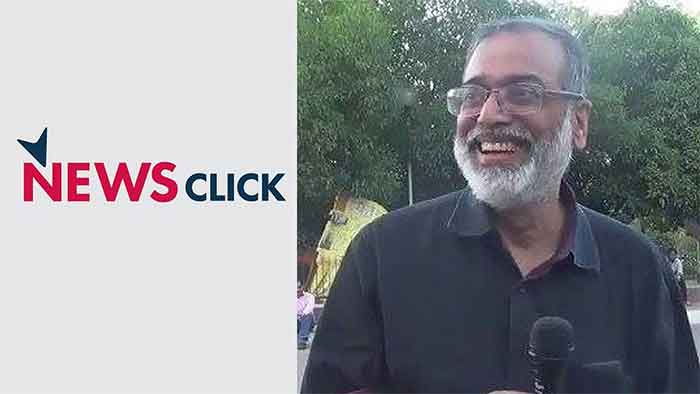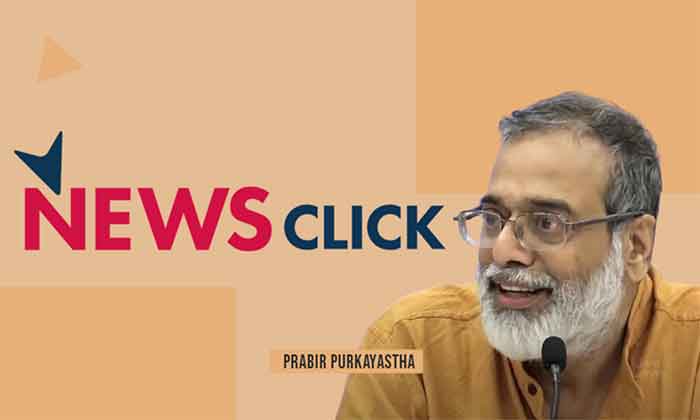
In a recent event that has triggered a wave of concern and debate, the residences of 46 journalists associated with NewsClick were subjected to search and seizure operations. This was accompanied by the arrests of two individuals. It is essential to recognize that these events are not isolated but are part of a larger political landscape that has popularized ambiguous phrases like ‘tukde-tukde gang’ and ‘Urban Naxal’.
The Persecution of Intellectuals
Many of these individuals targeted in the recent crackdown are academically and professionally connected with well-known institutions. Sohail Hashmi, Prabir Purkayastha, D. Raghunandan, and Urmilesh are among those who share academic backgrounds with the author. Hashmi, for instance, is a cultural historian and activist associated with SAHMAT, and his involvement in any anti-national activities is highly questionable, given his long-standing contributions to cultural history and activism.
Reflecting on the days at Jawaharlal Nehru University (JNU) during the 1970s and 1980s, several esteemed contemporaries such as Sohail Hashmi, Prabir Purkayastha, D. Raghunandan, and Urmilesh. Sohail Hashmi, hailing from a leftist freedom fighter family and associated with the Students Federation of India, stood as a beacon of cultural understanding. His evolution into a cultural historian and continued activism with SAHMAT alongside his sister Shabnam are testament to his commitment. However, labeling him as part of any anti-national activity is as true as the spiritual discourses of Kabir, Guru Nanak Dev, and Baba Gorakhnath amalgamating.
Prabir Purkayastha, a prominent student activist at JNU and a motivational speaker in various political discussions, was a remarkable individual whose ideology never eclipsed personal friendships across the political spectrum. These individuals, along with many others, have contributed significantly to society through academia, activism, and meaningful dialogue.
The Urban Naxals
The term ‘Urban Naxal’ is problematic and misleading. It attempts to oversimplify complex socio-political issues and create an artificial dichotomy between rural and urban contexts, which is far from the truth. It is a label applied to individuals who voice concerns about human rights violations, social injustices, and government policies.
The crackdown on activists, journalists, and dissenting voices is reflective of an overarching trend where civil liberties and democratic values are under threat. The stifling of opposition and silencing of voices that question the government’s actions are reminiscent of authoritarian regimes. This growing trend is concerning and poses a significant threat to the democratic fabric of the nation.
In a true democracy, the right to express dissent and question those in power is fundamental. It is essential to nurture an environment where diverse opinions can coexist and contribute to a more informed and inclusive society. The recent events emphasize the need for transparency, accountability, and an unwavering commitment to upholding democratic principles.
The term ‘Urban Naxal’ gained prominence in the aftermath of the Elgar Parishad case in 2018. The meeting, meant to commemorate the bicentenary of the Bhima Koregaon battle, turned into a pretext for rounding up several ‘leftist’ activists under the draconian Unlawful Activities (Prevention) Act (UAPA). The allegations and the subsequent nomenclature of ‘Urban Naxal’ are incongruous and misleading.
The attempt to label activists and intellectuals as ‘Urban Naxals’ lacks a true understanding of what Naxalism represents. The movement began in 1946 in Telangana, addressing development deficits, dichotomies, and displacement-rehabilitation hiatus. The conflict for land and resources has been at the root of grassroots support and its expansion in the country.
However, despite its historical context, Naxalism never had a significant urban impact. The term ‘Urban Naxal’ emerged as a tool to target the intellectual support base comprising lawyers, journalists, university teachers, civil rights activists, and social workers. Since this section also opposed saffron politics, they were labeled ‘Urban Naxals’. This dissonant term attempts to undermine genuine concerns and suppress dissenting voices.
Wrapping up
It is essential to challenge and debunk misleading terms like ‘Urban Naxal’ that aim to stifle democratic voices. Upholding democratic values and the right to dissent is crucial for a thriving society, and the current crack-down on activists and journalists threatens the very essence of our democracy. We must strive for an environment where diverse opinions can flourish, fostering a society that respects differing perspectives and advocates for transparency and accountability.
(Mohd Ziyauallah Khan is a freelance content writer based in Nagpur. He is also an activist and social entrepreneur, co-founder of the group TruthScape, a team of digital activists fighting disinformation on social media.”)












































